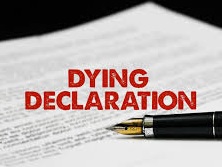(CRIMINAL APPEAL NO. 2281 OF 2011)
Supreme Court Explains Principles Relating to Dying Declaration
In a landmark judgment, the Supreme Court of India has delivered an extensive analysis of the principles governing the admissibility and evidentiary value of dying declarations. The bench, comprising Justices Abhay S. Oka and Ujjal Bhuyan, dismissed the criminal appeal filed by Rajendra S/O Ramdas Kolhe.
Background of the case:
The case concerns the tragic death of Rekha Dhokne, a police constable who sustained severe burn injuries on July 22, 2002, in Ambajogai, Maharashtra. In her dying declaration (Exhibit 59), Rekha implicated her husband, Rajendra Kolhe (the appellant), and her brother-in-law, Suresh, accusing them of setting her on fire by pouring kerosene over her body. Rekha succumbed to her injuries on July 24, 2002.
The trial court convicted Rajendra Kolhe under Section 302 (murder) read with Section 34 (common intention) of the Indian Penal Code, sentencing him to life imprisonment. The Bombay High Court upheld this conviction, dismissing Kolhe’s appeal.
Legal Issue:
The primary legal issue before the Supreme Court was the admissibility and evidentiary value of Rekha’s dying declaration (Exhibit 59). The court conducted an extensive examination of the principles governing dying declarations, as outlined in Section 32(1) of the Indian Evidence Act, 1872, and supported by various precedents.
Decision of the Court:
After a thorough analysis of the evidence and legal principles, the Supreme Court upheld Rajendra Kolhe’s conviction and dismissed his appeal. The court made several observations:
- Authenticity and Reliability of Dying Declaration:
The court stressed that upon confirming the authenticity of a dying declaration, finding it credible and free from any coaching, it can serve as the sole basis for conviction without requiring corroboration.
Justice Ujjal Bhuyan affirmed, “Once this determination is made, a dying declaration carries significant sanctity and, as previously stated, can constitute the sole foundation for conviction.”
- Scrutiny of Dying Declaration:
The court emphasized the importance of closely examining a dying declaration to ascertain that it was not influenced by coaching, prompting, or imagination, and that the deceased was in a sound mental and physical condition to make such a statement.
- Evidentiary Value of Dying Declaration:
Drawing from previous judgments, the court reaffirmed that a dying declaration holds a “sacrosanct status” as evidence, originating directly from the deceased victim. When the court is convinced of its veracity, a dying declaration can alone suffice for conviction without requiring corroboration.
- Inconsistencies and Improvements in Witness Testimony:
The court acknowledged that there were certain inconsistencies and improvements in the testimony of prosecution witnesses but deemed them insignificant. The court noted that such variations are normal when recalling events after a considerable passage of time.
~Arisha Qureshi (Legal Intern)


Always a pleasant experience at this pharmacy.
lisinopril online no script
They provide global solutions to local health challenges.
Their global health resources are unmatched.
how to buy generic cytotec online
I always feel valued and heard at this pharmacy.
The staff always ensures confidentiality and privacy.
order fluoxetine
Leading the way in global pharmaceutical services.
I value their commitment to customer health.
can you get clomid no prescription
Speedy service with a smile!
Actual trends of drug.
how can i get generic cytotec online
This pharmacy has a wonderful community feel.
https://t.me/s/pt1win/394
Актуальные рейтинги лицензионных онлайн-казино по выплатам, бонусам, минимальным депозитам и крипте — без воды и купленной мишуры. Только площадки, которые проходят живой отбор по деньгам, условиям и опыту игроков.
Следить за обновлениями можно здесь: https://t.me/s/reitingcasino
https://t.me/iGaming_live/4659
https://t.me/s/iGaming_live/4670
https://t.me/reyting_topcazino/18
https://t.me/of_1xbet/876
https://t.me/s/ef_beef
https://t.me/s/officials_pokerdom/3593
https://t.me/s/iGaming_live/4866
https://t.me/iGaming_live/4872
https://t.me/s/iGaming_live/4875
http://images.google.ki/url?q=https://t.me/officials_7k/836
В лабиринте ставок, где любой сайт стремится зацепить заверениями легких призов, рейтинг лучших казино
превращается как раз той ориентиром, которая направляет сквозь дебри подвохов. Для профи плюс новичков, что пресытился с ложных заверений, это инструмент, чтобы почувствовать настоящую отдачу, будто вес золотой фишки в ладони. Минус ненужной ерунды, лишь проверенные сайты, в которых отдача не просто цифра, но конкретная удача.Составлено на основе поисковых поисков, будто сеть, что ловит самые свежие тренды по интернете. Здесь отсутствует места для шаблонных трюков, любой момент как ставка у игре, в котором блеф раскрывается мгновенно. Игроки понимают: по стране тон письма на иронией, где юмор притворяется как намёк, позволяет избежать обмана.На https://heylink.me/don8play такой топ находится будто готовая колода, приготовленный для старту. Посмотри, когда хочешь почувствовать ритм реальной ставки, минуя иллюзий плюс неудач. Игрокам кто ценит тактильность приза, он как иметь фишки на пальцах, а не глядеть на экран.